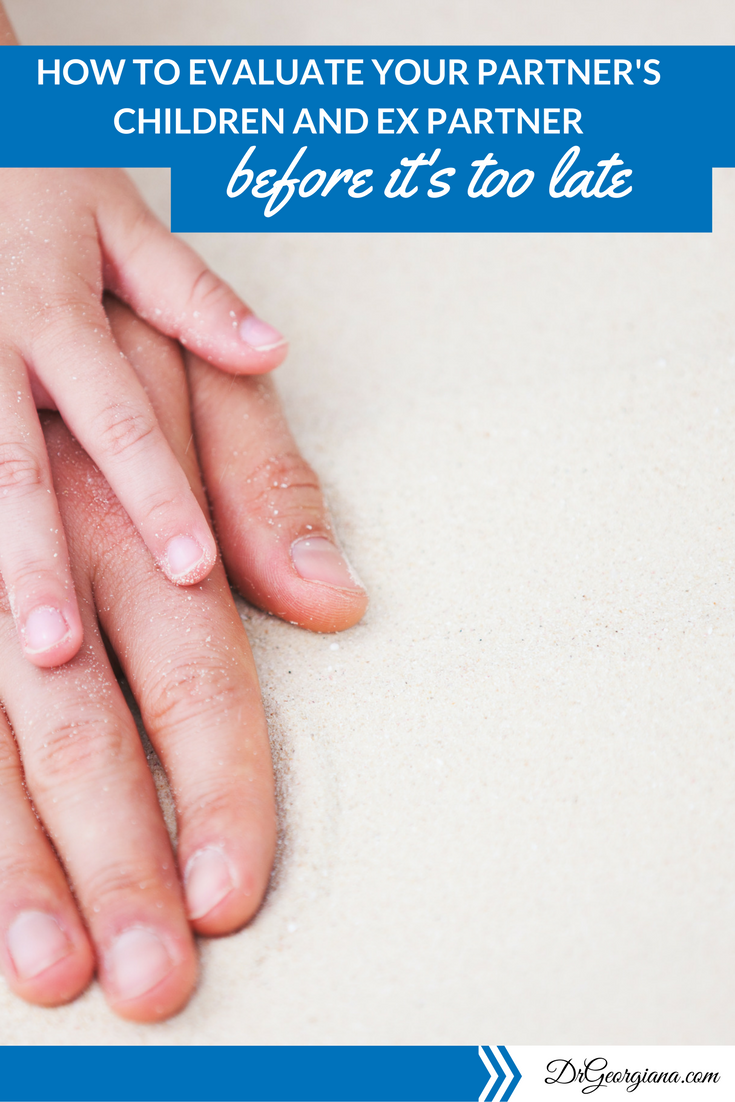
Are you dating someone with kids and an ex and wondering how your life would be if you decided to commit to a long-term relationship? If this is the case, this article can help. Welcome to the “Ask Dr. Georgiana” Relationship Series. This week we will be discussing how to evaluate your partner’s children and ex-partner before it’s too late! This article is a response to a question I received from Tiana, from Los Angeles, California. She said the following:
“Dr. Georgiana, I have been in a committed relationship for 12 months and have yet to meet any of his family members. He has been divorced for 5 years and has 2 children from that marriage, but rarely sees them. Last week, he told me that his ex-wife and children will be moving back to Los Angeles from New York and that he wants me to marry him and accept the role of step-mom. I am skeptical because apparently he had a lot of legal problems with his ex-wife and she sounds emotionally unstable. I am new at dating someone with kids. How do I make sure that I am not entering a lion’s den?”
Tiana’s problem is fairly common. The older you are the more likely it is that your partner will have children from previous relationships. This means that you have to meet and evaluate your partner’s immediate family and the people with whom they had children, as well as the children themselves.
Moving forward, here are the most important things to keep track of when dating someone with kids.
- The level of closeness between your partner and their children
If your partner has children from a previous relationship, you must evaluate how close they are. This is particularly important if you are planning to have your own children with them. A lack of closeness may suggest that the children are carrying resentment toward your partner for something he or she may have done or that your partner has been unable to create a strong bond with them. So observe their interactions, ask questions and listen closely to what both your partner and the children say about each other. This will give you a glimpse of how your partner may relate to your children if you were to have any together in the future. The fact that Tiana’s boyfriend did not have any interaction with his children requires further investigation. It is important for her to understand what happened, who created the distance, and how her boyfriend feels about them. If he created the distance in order to avoid child support, to avoid investing time in childrearing, or if he overlooked the children’s feelings in any way, this may be a real problem for her.
- Any unresolved issues between your partner and their children
When there is separation in a family with children, everybody suffers. So you need to understand what happened during the separation and what issues are still unresolved. Do the children blame one of the parents? Does that parent acknowledge the problem? Will they take the necessary steps to fix it?
- The level of maturity of everyone involved
You should hope that the ex-partner would be relatively mature because that is going to affect his or her ability to make sound decisions, to resolve conflict, and to shield the children and you from any negative dynamics with your partner. If your partner’s ex is immature and emotionally unhealthy, evaluate how much exposure you will have to him or her and make a decision about your relationship with your partner accordingly.
- How each person handles conflict
You do not want to find yourself in the middle of a war between your partner and their ex. If your partner is skilled at handling conflict but the ex is not, you still have a problem. Talk to your partner about the issues that create conflict in the relationship with the ex-partner and ask for a plan of action to address them. If the plan makes sense but you feel that there is no possibility of implementing it, you probably need to reevaluate your relationship.
- The ability of your partner and their ex-partner to co-parent
Co-parenting is not easy after a separation or divorce, especially if there are a lot of stored up resentments. If your partner and their ex have difficulties in co-parenting, what are they planning to do about them? Are they willing to seek help? If they are not, you can assume that it will not be an easy ride for you.
- How each person handles emotions such as anger and jealousy
If you have been in a relationship for a while, you probably know how your partner handles emotions. But you also need to evaluate how both the ex-partner and the children handle anger and jealousy. Make sure that you have the children around you for a while before you commit any further to the relationship so that you can observe how they behave around you and any children you have with your partner. Also, evaluate how the ex-partner feels about you: do they treat you with respect or do they express negative feelings that are unreasonable?
- How able and willing are your partner and their ex to shield you from their negative interactions
You should expect that they will be committed to not involve you in their conflict. Have a conversation with your partner about how he or she plans to protect you from it and if the answer is not to your satisfaction, you should reconsider a deeper commitment.
- Your partner and their ex’s expectations of you
If you are dating someone with kids and your partner expects you to parent their children from a previous relationship, there should be some support coming your way. This may be in the form of an assistant, a part-time nanny or participation from your partner in the tasks required. Keep in mind that the ex-partner may also have expectations of you as a stepparent. Find out what those are and ask yourself whether or not you agree with them. If you do not and you partner is not willing to back you up, it may not be a good situation for you to get involved in. I hope that this article has offered you some insight on the challenges of dating someone with kids. Know that you are not alone, as there are thousands of people around the world dealing with similar issues. If you are dating someone with kids, take the time to evaluate all of the people who will be affecting your daily life and know that no matter how much you love your partner you should expect a minimum of peace of mind. Love does not have to lead to struggle and painful sacrifice. Trust your judgment and act accordingly. I am honored to be part of your journey to find and keep the right partner and look forward to sharing future articles with you, speaking with you in one of my online relationship programs, or having a personalized Relationship Coaching session. Your comments are very important to me and help me guide future article choices. If you have dated someone with kids before, PLEASE SHARE YOUR THOUGHTS WITH ME! You can comment below, or on my Facebook page. I will read all of your comments and make every effort to address your questions, struggles and concerns in future articles.
ABOUT THE AUTHOR
Author Georgiana Spradling, Ph.D., MFT, CDVC, is a multicultural and multilingual (English, Spanish, & French) Emotional Intelligence Relationship Coach with over 20 years of experience helping people choose the right partners and avoid the wrong ones, manage emotions and behaviors in self and others, leave unhealthy partnerships, and move past old relationships. She is a Certified Domestic Violence Counselor and has a Certificate as an Anger Management Facilitator.
Her e-book: “Don’t Get Stuck with the Wrong Partner: Learn to Detect Unhealthy Traits and Behaviors in Others” is available on Amazon Kindle. You can subscribe to her YouTube channel on the undesirable sides of dating, committed relationships, separation and divorce at http://bit.ly/AskDrGYT and sign-up to her online news bulletin at www.drgeorgiana.com.
Dr. Georgiana coaches on the telephone, online or in her office in San Francisco (USA) and offers a FREE 25-minute Consultation. She can be reached through her website: www.drgeorgiana.com, by e-mail: gs@drgeorgiana.com or phone: 1-650-731-5105.
